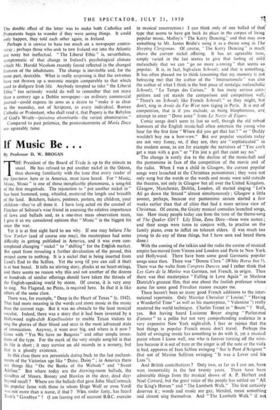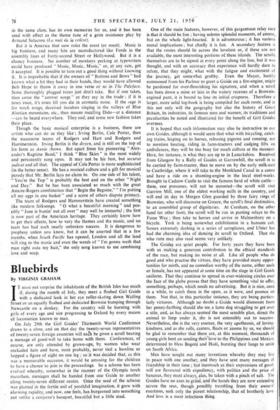If Music Be . . .
By Professor D. W. BROGAN
THE President of the Board of Trade is up to the minute as usual. He has refused to put another nickel in the Odeon, thus showing familiarity with the tune that every reader of the Spectator, here or in America, must have heard. For " Music, Music, Music " is one of those inexplicable phenomena, a song-hit of the first magnitude. The injunction to " put another nickel in " has been hummed, sung, whistled, muttered the length and breadth of the land. Butchers, bakers, postmen, porters, my children, your children—they've all done it. I have long acted on the counsel of Fletcher of Saltoun's wise friend in assessing the relative importance of laws and ballads and, as a one-man mass observation team, I give it as my considered opinion that " Music " is the biggest hit since the war.
Yet it is at first sight hard to see why. If one may believe The New Yorker (and of course one may), the masterpiece had some difficulty in getting published in America, and it was even con- templated changing " nickel " to " shilling" for the English market. But apart from revealing a further devaluation of the pound, this project came to nothing. It is a nickel that is being inserted from Land's End to the Scillies. Yet the song (if you can call it that) is at best banal. It tells no stirring story, plucks at no heart-strings, and there seems no reason why this and not another of the dozens or hundreds of similar offerings should have taken the throats of the English-speaking world by storm. Of course, it is very easy to sing. No Flagstad, no Pinza, is required here. In that it is like others of the same class.
There was, for example, " Deep in the Heart of Texas " (c. 1942). That had more meaning in the words and more music in the music than the current rage. But it was no obstacle to the least musical vocalist. Indeed, there was a story that it had been invented by a Hollywood night-club Kapellmeister to enable Texan Visitors to sing the glories of their blood and state in the most advanced state of intoxication. Anyway, it went over big, and where is it now ? Gone with " Yes We have no Baronas " and other simple inven- tions of the type. For the mark of the very simple song-hit is that its life is short ; it may survive on old records in a nursery, but that is a ghostly existence.
In this class there are perennials dating back to the last enchant- ments of the Victorian age like " Daisy, Daisy " ; in America there are things like " On the Banks of the Wabash " and " Sweet Adeline." But where today are the drawing-room ballads,. the standbys of Messrs. Boosey and Hawker in the dear, dead days beyond recall ? Where are the ballads that gave John MacCormack his popular fame with those to whom Hugo Wolf or even Verdi was not more than a name, if that ? Who, under forty, has heard Tosti's " Goodbye-" ? (I am leaving out of account B.B.C. exercise
in musical resurrection.) I can think only of one ballad of that' type that seems to have got back its place in the corpus of living' popular music, Molloy's " The Kerry Dancing," and that may owe. something to Mr. James Bridie's using it as a theme song in The Sleeping Clergyman. Of course, The Kerry Dancing " is much' above the current nickel . offering. It has an agreeable tune, simply varied in the last stanza to give that feeling of mild melancholy that we can " go no more a-roving " that seems so popular. It is, in fact, high-class Schmalz, and that is something.' It has often pleased me to think (assuming that my memory is not betraying me) that the author of the " Internationale " was also the author of what I think is the best piece of nostalgic melancholic Schmalz, " Le Temps des Cerises." It has many serious com-1 petitors and yet stands the comparison and competition well.I " There's no Schmalz like French Schmalz" as they might, but. don't, sing in Annie du Far West now raging in Paris. It is out of competition, that is if you exclude, as being blasphemous, any attempt to enter " Dove sono " from Le Nozze di Figaro.
Comic songs don't seem to last so well, though the old robust humours of the English music-hall often entertain the young who hear for the first time " Where did you get that hat ? " or " Daddy wouldn't buy me a bow-wow." But our popular vocalists today are not very funny, or, if they are, they are " sophisticated " in the modern sense, as are for example the narrators of " You can't get a man with a gun" or " I'm jest a girl that caint say no." ,
The change is surely due to the decline of the music-hall and the pantomime in face of the competition of the movie and of the radio. When I was a child in Glasgow, the current populat songs were launched at the Christmas pantomimes ; they were not only sung but the words or the words and music were sold outside the theatres, not only in Glasgow but all over the United Kingdom. Glasgow, Manchester, Dublin, London, all started singing " Let's All go down the Strand " almost simultaneously ; Glasgow a little sooner, perhaps, because our pantomime season started a few weeks earlier than that of cities that had a more serious view of Christmas. Of course, the Gaiety musical comedies launched songs, too. How many people today can hum the tune of the theme-song of The Quaker Girl? Lily Elsie, Zena Dare—these were names ; and their songs were tunes to conjure with, to practise on the family piano, even to inflict on tolerant elders. (I was much too young to do any of these things, but I have seen and heard them done.)
With the coming of the talkies and the radio the course of musical empire has moved from Vienna and London and Paris to New York and Hollywood. There have been some good Germanic popular songs since then. There was " Donna Clara " (White Horse Inn ?). There was the waltz from Congress Dances, and I rather think that Les Gars de la Marine was German, not French, in origin. Then there was that masterpiece " Falling in Love Again " in Marlene Dietrich's greatest film, that one about the foolish professor whose name for some good Freudian reason escapes me.
There haven't been so many good French additions to the inter- national repertoire. Only Maurice Chevalier (" Louise," " Having a Wonderful Time " as well as his masterpiece, " Valentine ") really mastered the world technique. Charles Trenet in " Bourn " ? Well, yes. But having heard Lucienne Boyer singing " Parlez-moi d'amour " to a polite but not very comprehending audience in a very expensive New York night-club, I fear or rejoice that the best things in popular French music don't travel. Perhaps the habit of swinging music has something to do with it, yet a musical purist whom I know well, one who is forever turning off the wire- - less because it is out of tune or the singer is off the note or the viola is bad, approves of Jean Sablon swinging " Sur le Pont d'Avignon " (but not of Maxine Sullivan swinging " It was a Lover and his Lass ").
And British contributions ? Only two, as far as I can see, have won immortality in the last twenty years. There have been admirable things from the musical shows of A. P. Herbert and Noel Coward, but the great voice of the people has settled on " All the King's Horses " and " The Lambeth Walk." The first certainly deserves it ; words and music are gay, blended, mean something and almost sing themselves. And " The Lambeth Walk " if not, in the same class, has its own memories for us, and it has been used with effect as the theme tune of a grim resistance play by Armand Salacrou (La nuit de la cokre).
But it is America that now rules the roost (or roast). Music is big business, and many hits are manufactured like Fords in the assembly lines of Forty-second Street or Hollywood. But it is a chancy business. No number of monkeys pecking at typewriters could have produced " Music, Music, Music," or, at any rate, got it accepted. It is possible to turn out a good thing without knowing it. It is improbable that if the owners of " Buttons and Bows " had known what a hit.they had in their hands, they would have allowed Bob Hope to throw it away in one verse or so in The Paleface. Some thoroughly plugged tunes just don't take. But if one takes, then come the " answer songs " as they say in the trade ; if it is roses once, it's roses till you die in aromatic noise. If the rage is for torch songs, deceived Maidens singing in the valleys of Blue Alsatian mountains, etc., then moans recalling Dido—at a distance —can be heard everywhere. They end, and some new fashion takes their place.
Though the basic musical enterprise is a business, there are artists who can do as they like ; Irving Berlin, Cole Porter, then the successive teams of Rodgers and Hart and Rodgers and Hanimerstein. Irving Berlin is the doyen, and is still on the top of his form as Annie Chows. But apart from his pioneering " Alex- ander's Ragtime Band," I think " Blue Skies " is the most widely and persistently sung opus. It may not be his best, but securus judicat and all that. The appeal of Cole Porter is more sophisticated (in the better sense). He has a musical culture and a gift for musical parody that Mr. Berlin lays no claim to. On one side of his talent, " You're the Top " is probably the best and on the other " Night and Day." But he has been associated so much with the great Astaire-Rogers combination that " Begin the Beguine," " I'm putting all my eggs in one basket " and a score of others dispute primacy.
The team of Rodgers and Hammerstein have created something like modern folksongs. " 0 what a beautiful morning " and pos- sibly " June is bustin' out all over " may well be immortal ; the first is now part of the American heritage. They certainly know how to get their effects, how to vary the themes and the music, and no team has had ' such nearly unbroken success. It is dangerous to prophesy unless you know, but it can be asserted that in a few months, when South Pacific has opened, London and all the land will ring to the music and even the words of " I'm gonna wash that man right outa my hair," the only song known to me combining love and soap.



































 Previous page
Previous page